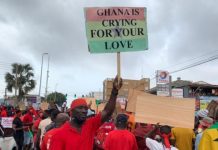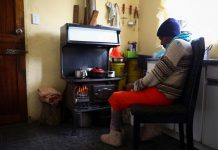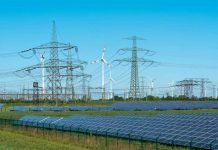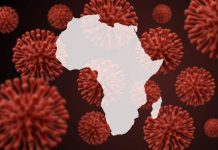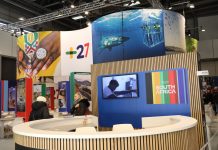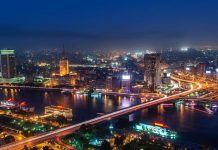- Political Situation
Cabo Verde is a free and democratic country which respects the principle of the separation of powers, in particular the executive, the legislature and the judiciary. The regular organization of free and transparent elections since 1991 has permitted to achieve democratic and peaceful alternations at the head of the country.
It should be noted that Cabo Verde is currently experiencing a period of cohabitation between the President of the Republic and the Government who come from different political camps due to its configuration of the semi-presidential regime, also called mixed parliamentary regime.
The recent opening of the Embassy of Cabo Verde in Nigeria, which represents the country within ECOWAS, is an important step in Cabo Verde’s regional integration as it aims to strengthen political, economic and cultural relations with Nigeria and the other ECOWAS countries.
- Security Situation
The geographical position of Cabo Verde, which is at the crossroads of the routes used by transnational organized crime, the geographical dispersion of the islands and the existence in all the islands of port facilities that are difficult to control, make the country a preferential logistics point. In this context, the State has opted for supranational intervention and the strengthening of international cooperation. The objective is to ensure flawless surveillance and control of the national maritime space, as well as participation in international instruments to combat international trafficking, in particular of drugs, weapons and human beings.
With regard to internal security and the fight against organized crime, the State has taken a series of measures based on the principle of “zero tolerance of crime”.
III. Health Situation
Since the confirmation of the first positive case of COVID-19 in Cabo Verde on March 20, 2020, a total number of 56,738 positive cases, 43 deaths and 55,983 recoveries have been recorded as of June 08, 2022. During this period, there have been both increases and decreases in the daily number of infections, the most critical situation having taken place between December 2021 and January 2022 with more than 1,000 cases per day.
Fortunately, the number of cases was kept to a minimum in April/May, but it is currently trending upwards with 103 new infections recorded on June 8, bringing the number of active cases to 301. It should be noted that on January 4, 2022, the presence of the Omicron variant was confirmed in Santiago, which heightened concern in the country.
The vaccination campaign started on March 18, 2021. As of June 8, 2022, 82.8% of the target population had taken the first dose of vaccine and 67.6%, two doses. For the year 2022, the country’s objective is to vaccinate 90% of the population against COVID-19.
- State of Implementation of Community Texts
Cabo Verde’s integration into ECOWAS presupposes compliance with criteria such as governance and development that involve the rule of law and democracy, economic integration with effective common programmes, as well as legal integration that also permits the States to establish standards for the defence of general rather than individual interests.
Cabo Verde continues to work for the ratification of the various community texts that have not yet been ratified. Indeed, several ECOWAS institutions visited the country and discussed several issues. This helped the Cabo Verde MPs in the ECOWAS Parliament to sensitize the authorities to achieve this objective.
It is important to highlight the publication of instruments related to the integration of Cabo Verde into the Community, including the ratification of 44 agreements, conventions and treaties.
Similarly, progress has been made on the issue of movement of ECOWAS citizens. Cabo Verde has already complied with the decision taken in June 2012 by Heads of State regarding the introduction of biometric identity cards and passports in all Member States.
Thanks to the principle of free movement of persons and goods, nationals of ECOWAS sister countries still constitute the largest number of immigrants in Cabo Verde. However, there is a relative decline in the number of immigrants in the country, a situation that may be linked to the COVID-19 pandemic.
Indeed, in 2010, 14,000 foreigners resided in Cabo Verde, but this figure rose to 10,875, according to the 2021 census, which shows a clear decline. Among foreign residents, 11.3% are from Guinea-Bissau, 10% from Senegal and 3.8% from Nigeria.
On the issue of regularization, taking into account a request from immigrants who arrived in the country for a period of 90 days but who remained there for several years, a law was adopted in 2021 aimed at simplifying the regularization procedures for immigrants who have entered our territory up to 2020. The said law has enabled many immigrants from ECOWAS countries to obtain their residence permit.
4.1 Human Rights
The 2nd National Human Rights Report 2010-2019, published in February 2020, updates the information contained in the 1st report, with regard to international instruments and the legal framework. The report carefully analyses the new public policies adopted and implemented, as well as their impact on Human Rights in the country.
According to the report, Cabo Verde is among the world’s champions in the promotion and protection of Human Rights, as evidenced by progress made in recent years in this area. However, the country faces many challenges as gaps remain and public policies and actions need to be taken in order to better guarantee Human Rights in the country.
The recommendations of this study are in perfect harmony with those formulated by the international treaty committees and the actions and/or measures contained in the 2nd PNADHC (National Action Plan for Human Rights and Citizenship 2017-2021).
The country is still experiencing situations of injustice and inequality which, although being special cases, disrupt the functioning of the nation, challenge the authorities and require a permanent search for solutions.
4.1 Freedom of Expression
In this regard, there is no concern related to likely hindrances to the exercise of freedom of expression by individuals.
There have been no reports of violations of this constitutional right in its various forms of expression, nor of direct censorship of any kind. On the contrary, freedom in certain areas has allowed the dynamic exercise of the most diverse forms of freedom of expression and opinion, sometimes crossing the line between the promotion of freedom of expression and opinion and the protection of the honour and image of citizens.
4.2 Freedom of Information / Freedom of the Press
For several years, Cabo Verde has occupied a place among the top 30 in the world press freedom ranking established by Reporters Without Borders (RSF).
The absence of attacks on journalists and freedom of the press, guaranteed by the Constitution of the Republic, make Cabo Verde a country where the last defamation case dates back to 2002.
However, according to RSF, the emergence of private media has been hampered by limited advertising revenues and the absence of public subsidies. Furthermore, the geographical location of the archipelago makes it difficult to distribute the written press and radio broadcasting in the 10 islands.
4.3 Freedom of Assembly and Demonstration
Since it is a fundamental right, which essentially provides for obligations on the part of the public authorities, these are fulfilled at the legislative and administrative level, in particular with the guarantee of the institutions that already exist. Therefore, the need and the impact of public policies in this area are not very felt since there are no reports or denunciations of violations of the right to assembly and demonstration in Cabo Verde.
4.4 Protection of the Rights of the Child
As we know, ill-treatment and sexual violence against children and adolescents is a scourge that reigns in many societies. In recent years, Cabo Verdean society has complained about the abusive and successive practices carried out against children and adolescents, advocating for a faster and stronger response from the courts, and for more effective and more efficient protection of children and adolescents.
Indeed, the Constitution of the Republic guarantees a relevant set of rights for children and young people, requiring the family, society and the public authorities to ensure the protection of these persons with a view to their full development.
Nevertheless, as part of the development of the 2022-2024 2nd National Plan to Combat Sexual Violence against Children and Adolescents, data for the year 2020 has been presented. According to the said data, the competent departments of the ICCA found one hundred and seventy-two (172) cases of sexual abuse and exploitation of children and adolescents, although this rate represents a decrease of 10.88% compared to the year 2019.
In order to strengthen the repression of crimes committed against children and adolescents, and to put in place more rapid and effective mechanisms within the framework of criminal cases in which children and adolescents are victims, the National Parliament, in 2021, brought profound changes to the Criminal Code and the Code of Criminal Procedure.
In addition, the general legal regime for the protection of endangered children and adolescents has recently been approved, thus making it possible to regulate all situations of danger in which children or adolescents find themselves.
At the international level, Cabo Verde has signed important legal instruments relating to the promotion of the rights and protection of children and adolescents. It is worth highlighting the country’s recent accession to the Convention on Jurisdiction, Applicable Law, Recognition, Enforcement and Co-operation in Respect of Parental Responsibility and Measures for the Protection of Children, as well as to the Convention on international recovery of maintenance for children and other family members.
4.5 Women’s Rights
Cabo Verde has been making continuous efforts to analyze the situation of women in all walks of life and to identify areas of persistent of inequality.
These initiatives include the Gender Equality Act, which will be adopted by Parliament in 2019. The Act sets the minimum threshold for the representation of men and women on the lists of elected bodies at 40%. Thus, 27 women were elected out of 72 MPs, which corresponds to a rate of 37.5%. In addition, the current government has 9 women out of a total of 27 members, which corresponds to 33.3%.
Data from the Police and the Attorney’s Offices in Cabo Verde do not reveal complaints about the practice of female genital mutilation (FGM) performed in the country. FGM is considered a crime of gender-based violence (GBV), punished by GBV Act as a serious offence against physical integrity, and even punishment of the agents is possible even when the fact has not occurred in Cabo Verde, but the perpetrators are here.
4.6 Rights of Racial Minorities and Immigrants
The Constitution of the Republic of Cabo Verde converges with the main international principles regarding the fight against racial discrimination, the rights of immigrants and foreigners
Thus, any foreign citizen in Cabo Verde enjoys the same fundamental rights as Cabo Verdeans, with some exceptions, such as political rights.
Indeed, the Constitution expressly prohibits privileged treatment and/or discriminatory treatment, emphasizing the prohibition of racial discrimination, whether against nationals or foreigners.
- State of implementation of Community programmes and projects
Integration in Cabo Verde will have to be achieved through improved sea and air links. It is noteworthy that the pan-African airline, ASKY, has been operating three weekly flights between Praia, the capital of the country, and Dakar, the capital of Senegal, since 3 June, thus considerably improving connectivity between the country and the continent.
However, Cabo Verde is yet to see the adoption of the policy measures for the transport sector long advocated by the Commission (Priority Action Plan for West Africa, including the Infrastructure Development Programme for Africa). Given its unique status as the only island country in ECOWAS, Cabo Verde does not benefit from the motorway and rail infrastructure planned for the continent as part of a regional integration strategy.
Fostering renewable energies as an alternative to fossil fuels has been a strong bet, and the target of 50% coverage is expected in the coming years. The Regional Centre for Renewable Energy and Energy Efficiency (CEREEC), located in the city of Praia, contributes to this within the framework of the ECOWAS regional policy.
- Economic and social situation
Cabo Verde faces structural constraints to its economic development, namely a small local market, territorial fragmentation, high costs of transport, energy and water, compounded by high dependence on external inputs (fuel, food, commodities, intermediate goods) and financing (remittances, foreign direct investment (FDI), foreign loans, official development assistance (ODA), etc.)
6.1 Financing of the Economy
Always bearing in mind that investment is the key to restarting business and securing growth and employment, the government is continuing its efforts to promote improved conditions for financing productive activity, attracting and retaining foreign direct investment (FDI) and providing incentives for exports.
In order to respond to the country’s development strategy, a significant amount is allocated to the functioning of the public administration and to certain investment projects, a great part of which is allocated to the social sector.
In 2020 and 2021, the government used loans and grants to finance the negative impacts of the pandemic. In this respect, the financing of the costs of the pandemic was possible thanks to the control of operating expenses and the use of external financing.
The government has estimated that in 2022, the citizens of Cabo Verde should contribute to the costs of the health crisis. Thus, the costs should be co-financed by Cabo Verdean society through the gradual elimination of the total exemption from import duties, the strengthening of environmental and health taxation, and the broadening of the tax base with the implementation of the tax on electronic commerce.
6.2 The evolution of the economy in a crisis situation
The main growth areas of the economy are tourism services (25% of GDP, 75% of FDI and 39% of employment), FDI (5.7% of GDP in 2019, 12.5% in 2007) and remittances (11.1% of GDP in 2021). Due to the high dependence of its productive structure on the service sector, especially tourism and transport, and on FDI, Cabo Verde’s growth is very vulnerable to the fluctuation of external factors and to global shocks. These vulnerabilities exacerbated the effects of Covid-19 and resulted in one of the highest socio-economic impacts in the world.
Indeed, in 2020, Cabo Verde’s economic growth declined by 14.8%, making the country one of the most affected by Covid-19 pandemic. The external account performance, including the reduction in reserves, coupled with a decline in credit to the economy (3.7% in 2021 compared to 4.8% in 2020) has led to a decrease of about 2% of money supply. The slowdown in credit to the economy, and especially to the private sector, leads to a decline in the pace of domestic private investment. In the area of finance, foreign direct investment (FDI) decreased by 31.8%. As a result, a total of 19,718 people lost their jobs and 21,332 became unemployed.
Despite the effects of the pandemic which were also felt in the current account, there was a slight recovery in tourism, mainly in the last quarter, due to the resumption of tourist flights, and an increase in imports of goods and services, resulting in a deficit of about 13.3% of GDP. However, it is worth highlighting the 26.3% increase in remittances since the start of the pandemic, indicating significant solidarity with families during the crisis, especially the most vulnerable.
According to the government, 2022 public budget is an instrument that will bring about recovery, i.e., it serves as a bridge between a period heavily impacted by Covid-19 crisis and economic recovery. The starting point is marked by severe restrictions in public finances, by companies strongly affected by the crisis, as well as by the deepening of existing social vulnerabilities, i.e., the loss of about 20,000 jobs and the increase in impoverishment, bringing the poor population to about 175,000 people.
In 2022, given the forecast of a more dynamic tourism sector and, consequently, an increase in services exports, the current account deficit is expected to narrow to around 9.1% of the GDP.
6.4 Promoting social inclusion and combating poverty
Cabo Verde considers social development to be an essential part of the country’s development strategy and has made it a top priority to combat social inequalities that prevail in the country. In this regard, social policy is meant to promote human dignity and autonomy in a country where no one is left behind, through the creation of jobs, income and education.
Inclusive development requires, in addition to active policies to minimize social inequalities, gender equality and decent employment. The aim is to promote the social ascent of the most disadvantaged through access to work and the constant improvement of their income and living conditions, the adoption of measures to promote the creation of a system of childcare, the elderly and people with disabilities (mainly those belonging to the most vulnerable families).
- State of implementation of the macroeconomic convergence criteria
The State of Cabo Verde sees economic integration as a key factor in the political and social stabilization of the West African region. It therefore supports the idea that ECOWAS focuses on the objectives of greater economic and trade cooperation between its member states.
The economic outlook for 2022 remains bleak and uncertain, both domestically and externally, especially for countries dependent on tourism. In this context, public and external accounts will continue to show negative effects of the pandemic.
As the International Monetary Fund (IMF) projections for African countries show, the largest revision of projections in sub-Saharan Africa has occurred among tourism-dependent countries. In the case of the country’s economy, real GDP growth of 6% is projected for 2022 thanks to a more dynamic tourism sector.
VII. Environment and climate change
Extreme events such as drought and sporadic rainfall of a torrential nature are becoming more frequent, indicating the impact of climate change. Due to the importance of the potential effects of climate change in the country, the issue should be central to the authorities concerned. In this respect, a proper scientific approach should be adopted involving national research centres.
Cabo Verde is experiencing a severe drought that has been ongoing for three years. The situation leads to a reduction on water availability, agricultural and forage production, as well as the degradation of biological diversity and landscapes. Thus, the country needs to adopt not only an internal but also an external approach, as climate change is a global phenomenon that requires a regional and international framework, especially at the level of the UN specialized agencies. Significantly, Cabo Verde continues to participate in global and regional environmental research networks, especially those dealing with the phenomenon of climate change and its effects.
VIII. Payment of ECOWAS Community Levy
Efforts continue to be made by the country to meet its commitments regarding the payment of its debts to the organization. A debt repayment plan has been discussed with the ECOWAS Commission and we believe that implementation of this plan will start soon.
It should be noted that the government budget for 2022 provided for the payment of the existing Community Levy. However, it has not been possible to obtain information from the government on the actual disbursement and prospects for settlement of arrears, as public finance management in the current crisis situation remains complex.
- Sensitization activities by MPs.
We continue to intensify our advocacy activities at ECOWAS. MPs have developed a strategic communication programme with the media in the country. In addition, they have integrated into the activities celebrating Africa Day, exchanges with nationals of the various ECOWAS States living in the country.
Similarly, Cabo Verde delegation continues to maintain its Facebook page “DEPUTADOS DE CABO VERDE NA ECOWAS” which has thousands of subscribers and serves as a source of information for the Cabo Verdean media.
It is also worth highlighting the continuation of the weekly television programme, supported by the Ministry of Regional Integration, aimed at introducing all ECOWAS countries to the Cabo Verdean society. The programme of participation of Cabo Verde MPs in the delocalized meetings of the Joint Commissions and the ECOWAS Parliament Sessions continues to be shared with the national press through Facebook posts, newspaper articles and press releases.






